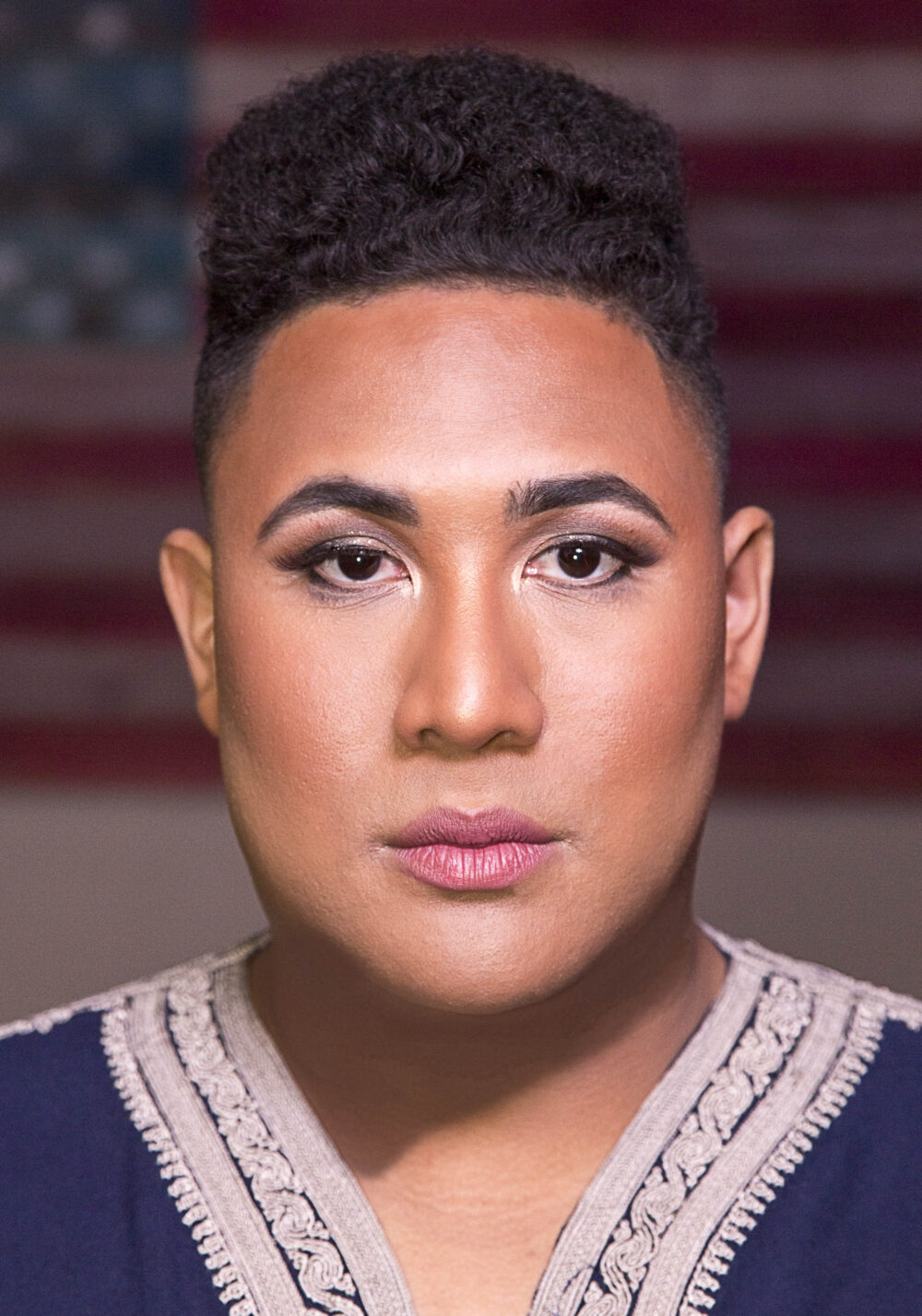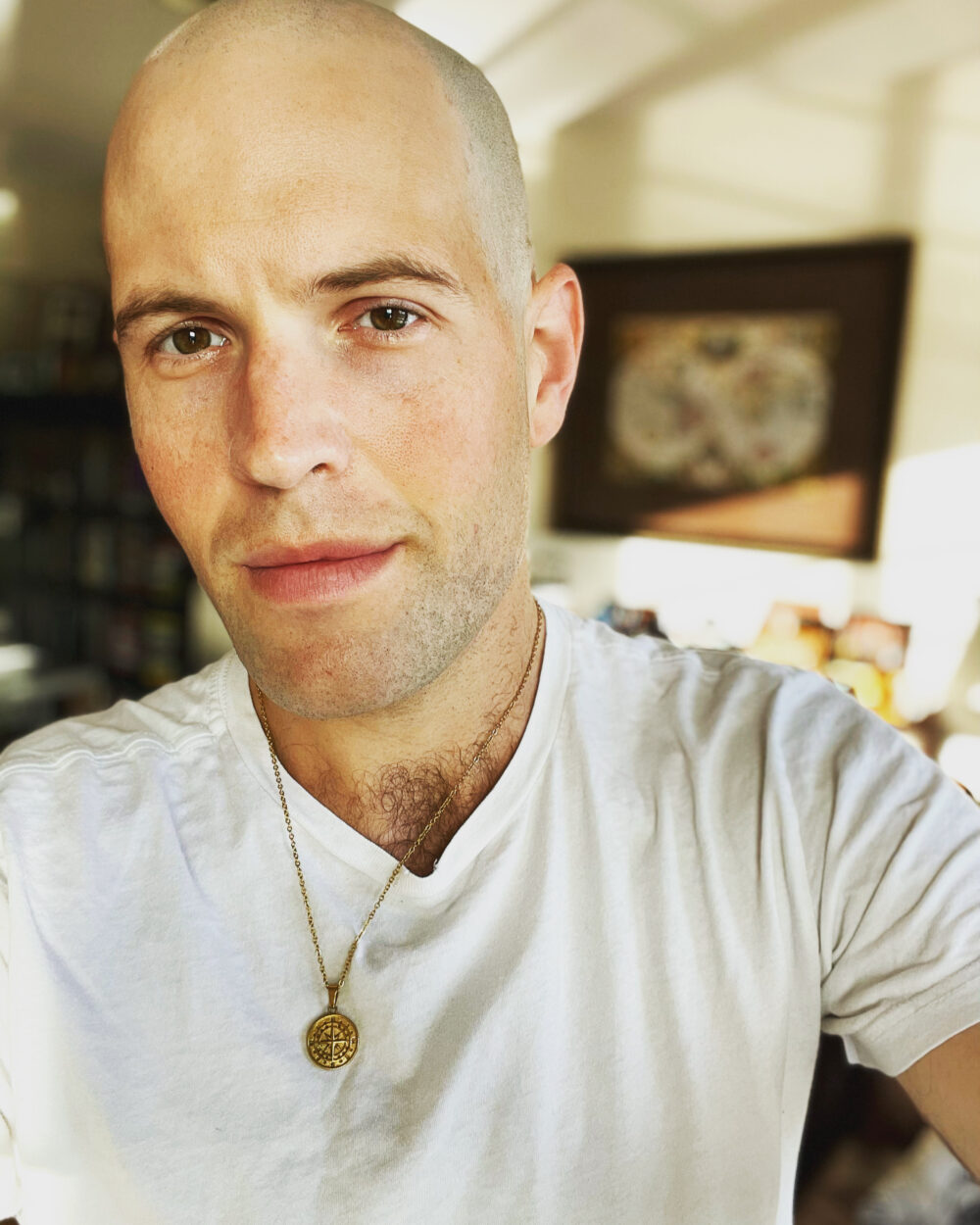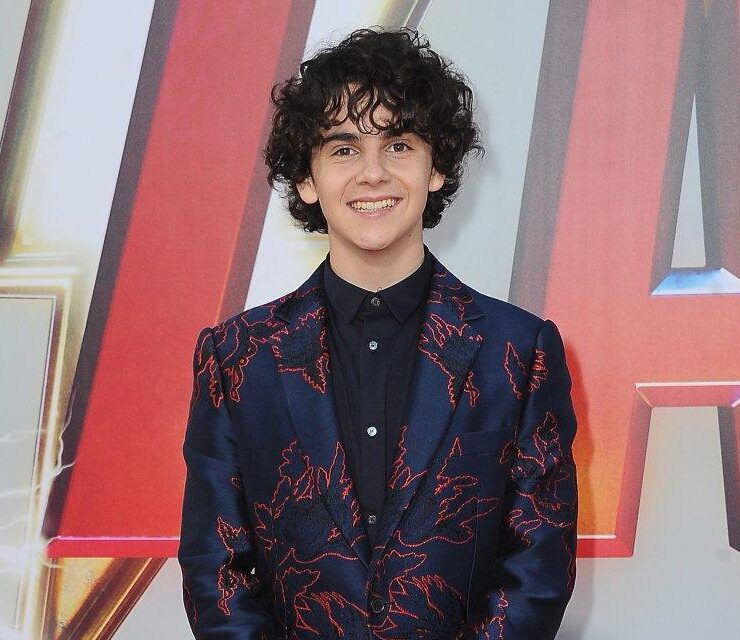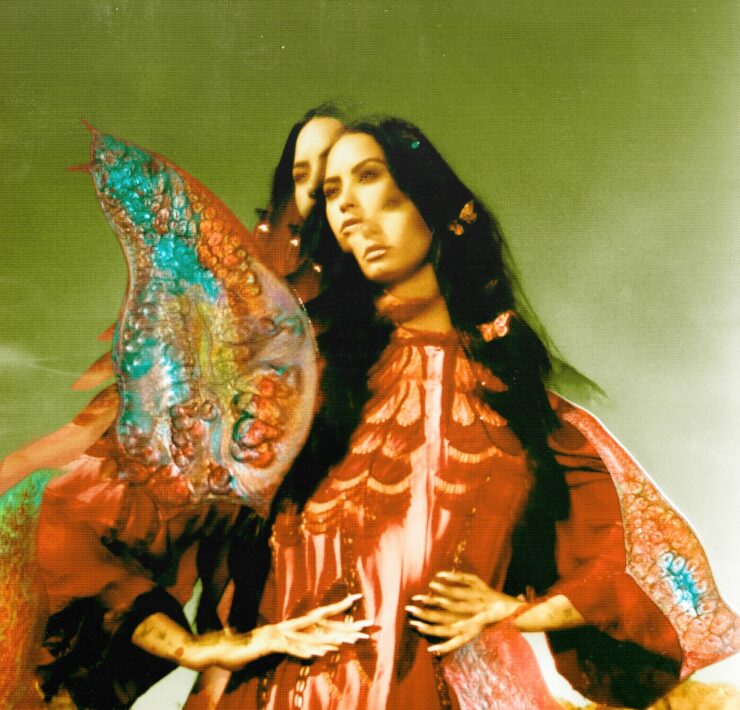Roger Q. Mason’s Taffeta: A Short Film Interview

OUT FRONT Magazine's Creative Director & Head of Design @…
Transgender-nonconforming (TGNC) writer and performer Roger Q. Mason and director Lovell Holder of Taffeta: A Short Film, revealed to OFM more about their newest creation that will be hitting queer film festivals soon!
What message do you hope the viewers take from this short film?
Roger: You know Taffeta, the character is, is a source of freedom and lack of inhibition for me, and the clarity and the strength of expression that I have gained as a writer and as a performer through that character is something that has really changed how I write and how I perform in television, film, and theater. The film Taffeta is really an extension of that freedom. And what I want people to get out of the film is that there is great power in knowing and celebrating your unapologetically real, vulnerable, and complicated self.
What inspired you to create Taffeta: A Short Film and share your story?
Roger: I have struggled with food addiction and with binge eating disorder my whole life, and it’s something that I’ve been confronting quite actively, in particular during the time of Corona, [looking at what] was a source of this self-destructive behavior, what are the forces that cause me to find fulfillment, affirmation, and company in the presence of food. I learned through this year of reflection it has to do with a kind of approval or admiration or attention, an affirmation that I seek or was seeking from other people—whether it’s family members, romantic relationships, social, or professional engagement.
There is a way in which this addiction is used to fill a void and a hole, a deficiency. And so the work of the person, not only me as the writer, but also of that character, is: How do you find joy and beauty in yourself, without this false medicine? How do you know and learn that I am good enough, and I don’t need to look to some man to tell me that I’m beautiful? I don’t need to look to a career, and I’m certainly not going to find it in addictive or self-destructive behaviors. So, using that sort of as a launching point, that was where I started building up the character of tech. And that was sort of the impetus for the play Lavender Men, which is the source material and inspiration for this short film.
Do your personal experiences as a genderfluid person reflect in the film?
Roger: That film is in many ways, a capture of my life. I will say this. When I moved to Chicago for graduate school, I saw my first gender-neutral bathroom. This was in 2014. I walked into it and used it with such relief and excitement for the world that was suddenly open to me. For once I had a room I could call my own. I was never welcome in the men’s restroom, and yet I existed in a space between those two worlds, and it was never afforded to me. Not physically or metaphysically, so now here, in this moment of revelation in Chicago, a space was opened up for me to be myself.
That allowed me to go back to all of those versions of myself when I was 10 years old, 12 years old, when I was 2 years old. Wearing a white, Christian Dior short pants suit with a stuffed animal pink cat standing, You know, looking all kinds of fabulous, too. I was already this person, but it was beaten out, it was shamed away over years of socialization, and it’s been a process, particularly the last five years, to get back to that individual, who with pride, with confidence, and with not a care or shame or worry in the world.
I could stand with my arms on my hips and my head tilted; not one damn thing was wrong because there wasn’t; there never was. So the film is an ode to that process of healing. Because what we don’t do in the film is victimize genderqueerness. That’s not the question of the film. The problem, the social problem of the film is not the fact that this individual Taffeta is genderqueer, and that’s on purpose. We’ve already done that sociological work, our state of being is the new normal. We are here; we always have been; we always will be. The TGNC Community has been and always will be an important part of this world. That’s the exciting frontier that we’re on, as, as transgender-nonconforming content creators right now.
How does it feel to advocate for your community and shed light on these topics?
Roger: First of all, the most important aspect of that question is, I have a community. I am able to define myself and find like beings and like-minded people. That was the first thing to learn: I’m not alone in this identity and this desire for equity in our world. So, the first step was defining myself and celebrating that person, and then finding others who, like me, are on the journey to loving that person.
And how does it feel to be an advocate for them? It’s my life’s work. I would not have it any other way. Every time I mentor a young writer or an artist or someone in other professions that shares the TGNC story, and they leave that conversation a little bit clearer or a little bit stronger or a little bit happier, my day is complete because I know that they are seen; they are loved, and they are amplifying in ways that they might not have been when they walked in, and that little dose of spiritual courage will last them a long time. It might help them get general for hard times and reach their next landing point in life.
Who or what provoked you to become a mass storyteller?
Roger: Mass media possesses the power to show an identity and a question about the human experience on a large scale. The transgender rights question is a national issue that needs to be reckoned with in this country and really in the world right now. It’s called transphobia. Mass media allows us to show the complexity of the TGNC story in a way that will move, not only those in the life, but also those outside of it, looking to learn about what those needs are. In doing so, it equalizes that equalization that does have civic, legislative, religious, cultural effects. Everything is subjective. Everything is based on how people feel about you. That’s why we want people to see this.
Does this playwright correlate with previous projects or performances?
Roger: There are plenty of themes that haunt my work, whether I’m writing for theater, television, or film. Certainly, the journey to self-love and visibility politics, are two of the themes that keep persisting, as I think about projects to write. I would say that those two ideas are certainly notions that are at the heart of Taffeta the film and also find their way into all of my other work.
Why do you think it’s vital for others to see this film? And how can people view the full film?
Roger: It’s vital for people to see Taffeta because it is a celebration of the transgender, and gender-nonconforming community, as well as a celebration of one person’s pursuit of love and affirmation in this world. That is a message that everybody can relate to. Everybody’s looking for love. Everybody’s looking for peace, and we are on the festival market right now. Look out on our Instagram.
Lovell: We can announce it’s coming to film festivals. We do have some festivals that are already committed to play at, but they have not formally announced yet. We would encourage people who are eager to see this project to reach out. If there’s a queer film festival that you’re a fan of, or any film festival that you’re a fan of, reach out and [say], ‘I heard about this short film, I want to see it; please program this film.’ We take requests.
Do you hope your story will help reflect onto others facing these challenges?
Roger: My earnest prayer is that my story, both in the film but also as an individual autobiographically, will inspire those who struggle with body image issues, with addiction issues, with intimacy issues, to know that there are others who are on that journey with them, that we have the power of each other, and that we will not take the bias, and abuse of our aggressors. We will insist on being seen as beautiful. And through that constant insistence in time.
Lovell: There’s also such a universality to loneliness as well because that’s also something that I don’t think you can speak about the film without speaking about loneliness and how tough it is. The character is choosing to fill certain voids, and I think that’s something we all confront is, how do we spend our time when we are alone, particularly those moments where it’s not a solitude by choice? Everyone, at one point or another, regardless of background has chosen unhealthy ways to spend that time, and there’s something about confronting that and looking at that. I think Taffeta is kind of remarkable because the audience will really leave the film, hopefully, wanting to see Taffeta make a different choice. Break some cycles, and you’re hopeful that they will, but it was very important to both of us that we not answer that question for the audience that Taffeta definitely does.
How important is this for you to be able to use your platform to make a difference?
Roger: My grandmother always said, ‘To whom much is given, much as expected in return.’ I have been blessed with the positive and negative things that have happened to me in my life. They have changed and molded who I am. They have motivated me to want to give back to the next generation. Because we, as transgender-nonconforming folks, only survive by the grace of community, and each other. Nobody else is able to help us better than each other. So if I can do anything, whether it’s to inspire somebody to be a shoulder for them to cry on, and to be a sounding board for ideas, I want to because I know what mentorship has helped me achieve [so much].
Lovell: Roger and I both feel that we’ve been given some tremendous opportunities. Over the course of our lives, we’ve both gotten phenomenal education, and we’ve had the privilege of working with tremendous collaborators. So, I know I personally feel a real responsibility to make work that I’m proud of and that I know for whom it’s for. It’s also a matter of recently something I’ve been coming to more and more—giving myself permission to not live in a place of scarcity and really just focus intently on a handful of projects that I really care about as opposed to spreading myself too thin. It’s a matter of taking the responsibility to say, ‘I’m going after this. I want to tell this story, and I know why I want to tell the story,’ and that’s something that just comes with age and also doing the thing.
Was the filming/acting process therapeutic or empowering in any way?
Roger: The filming process was fun as hell. I had never been more focused. When I was 12 years old, all I wanted to do was perform. I wanted to sing the blues. The 90s were called the “gay 90s,” but they were actually the gay 90s for the households of children who lived that life. I was queer-shamed out of performing because my family was afraid I’d become what they called at that time, a sissy-ass artist. And so, I was censored for many years from performing, first by the family, and then later, myself.
You see, bias works best when you start policing and shaming yourself, long after your aggressor has left the situation. So, I started policing myself. The film has been a homecoming. I am now that blissful, 12-year-old child that just wanted to sing the blues. And I’ve never felt freer, or more focused, or more fulfilled, than when I’m out there singing pretty for the legendary children because I’m singing their songs, and they empower them. But they also emboldened me, and I make strong artistic choices when I’m coming from the perspective of a performer. So, the process of filming this piece was not only cathartic, but it was metamorphosing. I’ve changed for the better because of this film. I became myself, both on-screen and off, and I’ll never be the same.
Taffeta played at the Benton Film Festival in Bentonville, AR from August 2-8, and will be at Outfest in Los Angeles, CA from August 13-22. Want to hear more from this charismatic duo? Hit up their podcast Sister Rogers Gayborhood.
 Photo Credit: Abdullah Helwani
Photo Credit: Abdullah Helwani

What's Your Reaction?
OUT FRONT Magazine's Creative Director & Head of Design @ Q Publishing House: She/They. Queer writer residing in Denver, Co. Inspired by LGBTQ+ stories.







